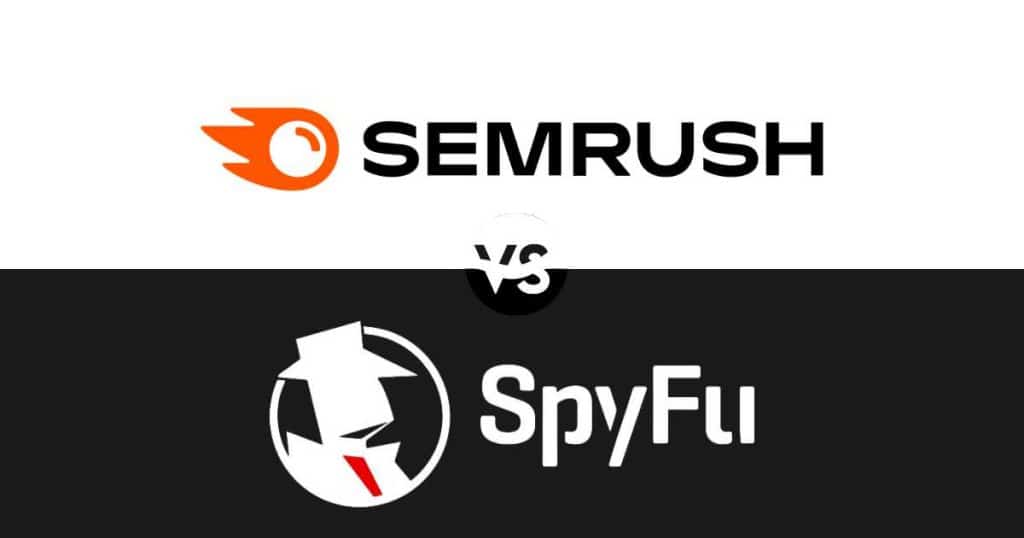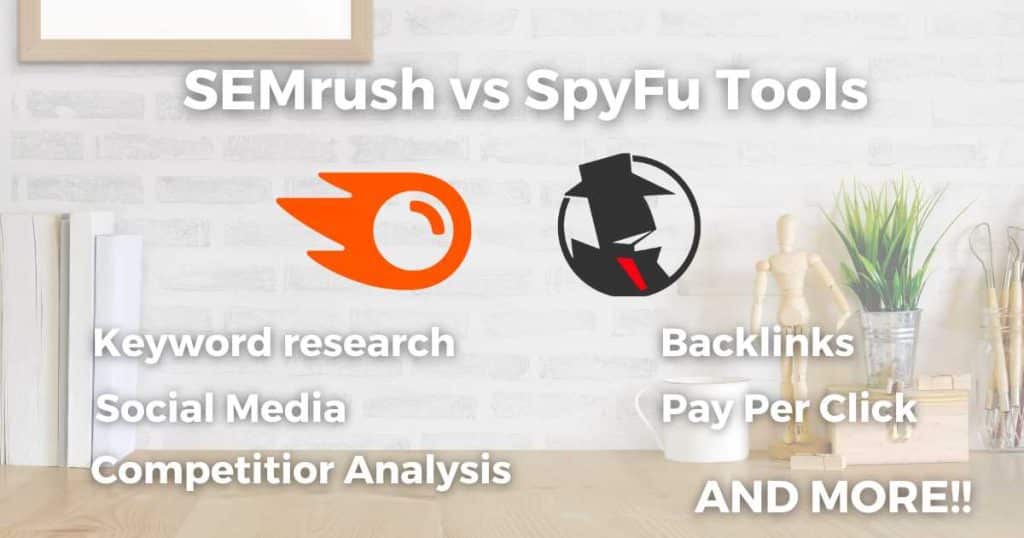Struggling to pick between SEMrush vs SpyFu?
Do you want to rank higher on search engines? Or maybe you just want to watch what your competitors are doing?
Nowadays, having the right SEO tools in your back pocket is crucial to stay ahead of the competition.
If you’re trying to boost your business’s online presence, you’ll probably have heard of SEMrush and SpyFu, two popular keyword research and competitor analysis platforms.
Read more: Keyword Everywhere Alternatives.
SEMrush vs SpyFu 2025

Both offer a suite of powerful features designed to help you optimize your search engine rankings and digital advertising campaigns.
But before you absent-mindedly flip a coin to decide which platform to use – listen up!
With so many factors to consider, from the price, features, and specifics of your business goals, you want to make sure you pick the best option.
So, how do you decide? Well, don’t worry, I’ve got you covered!
I’ll launch into everything there is to know about SEMrush and SpyFu to help you determine the right fit for you.
Are you ready to take your SEO and digital marketing game to the next level?
What Are They? SEMrush vs SpyFu
SEMrush is the ultimate all-in-one SEO and marketing toolkit that will revolutionize your digital presence (I’m not exaggerating!)
Harnessing the power of the most accurate and up-to-date keywords, SEMrush turbocharges your keyword rankings, propelling your website to the top of search engines!
But SEMrush isn’t just about keywords.
Its comprehensive suite of features unlock link-building strategies, keyword data analysis, website health audits, and competitor analysis (just to name a few).
And here’s the cherry on top: you have the power to download comprehensive SEO reports, engage in social media and paid marketing, and optimize your content like never before.
With SEMrush by your side, step up your online game and leave your competition in the dust.
On the other hand, SpyFu stepped onto the scene in 2006 with an innovative solution to revolutionize PPC and SEO strategies for marketers.
Since its inception, SpyFu has become a powerful force in keyword research planning and competitor analysis.
Armed with cutting-edge keyword research technologies, it empowers search engine marketers to unleash their full potential.
However, SpyFu is also not just a keyword research tool.
It also allows you to dive deeper into your search engine rankings, the strength of your domain, and PPC budgets.
Offering SEO tools to help with paid ads, backlinks, organic search, and competition intelligence, SpyFu is the ultimate weapon for marketers to dominate the competition!
Want to know more about SEMrush? Read my comprehensive SEMrush article here.
What Are The Differences Between SEMrush vs SpyFu?

SEMrush and SpyFu ultimately have the same goal: to skyrocket your business to success through SEO and digital marketing strategies.
However, when you dive into specifics, each tool is quite different.
SEMrush is a total marketing toolkit for business owners looking to enhance website visibility, attract quality leads, and convert leads to loyal customers.
On the other hand, SpyFu is more limited in features, focusing more on exposing your top competitors’ secret marketing and SEO strategies with in-depth competitor analysis tools.
Let’s look closer at the key differences between the two platforms now.
Ease Of Use
SpyFu boasts a simple, clutter-free interface with large fonts and easy-to-use tabs for quick navigation.
However, its ease of use is probably attributed to its lack of robust features (compared to SEMrush’s comprehensive toolkit).
SEMrush feels a lot busier because of how much you can simply do with the tool. And although SEMrush is easy to use, this number of features may overwhelm new users.
When I tested both products, SEMrush loaded data much faster when I tested both products, especially for organic search data.
While SpyFu excels at providing at-a-glance information, SEMrush is the ideal choice for detailed analysis, project-based work, and efficient link-building.
Winner = SpyFu.
Read more: SEMrush vs Moz
Pricing
SEMrush has a simple three-tiered pricing structure:
- Pro: $199.95 a month
- Guru: $229.95 a month.
- Business: $449.95 a month.
And to add another user to your account, it’s just another $45 per month for each user (but with a lot fewer features).
SpyFu has a similar pricing structure, which is a lot more affordable than SEMrush’s:
- Basic: $39 per month.
- Pro: $79 per month.
SpyFu wins the race when it comes to pricing plans.
However, one drawback of SpyFu is that there’s no free trial, making it virtually impossible to take it for a test drive.
Winner = SpyFu.
SEMrush vs SpyFu Tools

As mentioned, SEMrush is a total marketing toolkit, whereas SpyFu is a bit more niche in its offerings.
So, what tools exactly do both offer?
Shared features between SEMrush and SpyFu are as follows:
- Keyword Research.
- Competitive Analysis.
- Search Engine Results Page (SERP) Analysis.
- Backlink Analysis
Unique features of SEMrush include:
- Organic Traffic Insights.
- Site Audits.
- Social media management.
- Website monetization.
- Content marketing toolkit (content ideation, optimization, and distribution).
Unique features of SpyFu include:
- Domain and URL Comparison.
- AdWords Advisor for Google AdWords campaigns.
- AI technology.
- Better PPC (Pay Per Click) Research.
Winner = SEMrush.
Read more: What Is SEMrush? Breakdown For Beginners.
SEMrush vs SpyFu Key Features
Keyword Research:

Both tools offer solid keyword research tools, but SEMrush takes the cake with the largest keyword database!
There are four keyword research tools within the platform:
- Keyword Overview.
- Keyword Magic Tool.
- Keyword Manager.
- Organic Traffic Insights.
Read more about these features here.
SpyFu also does a good job at keyword research, but it falls short in terms of keyword database capacity (about half the number of keywords compared with SEMrush’s database).
Since keyword research plays such an important role in online marketing, let’s examine how some main features correlate.
Keyword Overview Feature:
Both tools deliver identical keyword overview data, such as keyword volume, similar keywords, estimated clicks, and CPC.
But when I tested both products at the same time, there was a difference in results, which I found interesting!
I put this down to the fact that SEMrush updates more regularly (and uses its own web crawler).
Magic Tool vs Related Keywords:
SEMrush’s Keyword Magic Tool boasts over 25 billion keywords, making it the ideal choice for discovering new keyword ideas.
How does it work? Simply input your target keyword – and let the tool do the rest!
With multiple filters on offer, you can easily narrow down your results and add advanced filters such as:
- Phrase match.
- Broad match.
- Exact match.
- Related.
SpyFu offers a similar keyword tool called Related Keywords, and the results are comparable to SEMrush’s.
However, SEMrush’s tool identifies more related keywords with higher volumes.
Keyword Manager vs Bulk Analysis:
SEMrush’s Keyword Manager allows you to compile a comprehensive list of relevant keywords that you can export (along with keyword metrics) to external tools.
Unfortunately, SpyFu lacks a comparable tool to SEMrush’s Keyword Manager.
However, they have a Bulk Upload feature for bulk uploading up to 1000 keywords, which can then be exported to other platforms (or within SpyFu).
Organic Traffic Insights (SEMrush):
This feature is an exclusive SEMrush tool that provides valuable insights into your organic traffic, combining data from Google Search Console, Google Analytics, and SEMrush.
The goal? To help you evaluate your performance in organic searches!
Winner = SEMrush.
Rank Tracking:

Want to keep a close eye on your website’s search engine rankings?
Everyone wants to see their website crawl to the top of search engines.
And with the help of SEMrush and SpyFu, you can receive analytics about just how well your website’s pages, keywords, and ranking are performing.
However, there are some noteworthy differences between the two:
- SEMrush’s Position Tracking offers a visibility score, estimated traffic, and average position bar on the top-left side, providing a comprehensive overview of your website’s performance.
- SpyFu’s Rank Tracking tool provides a useful graph that shows organic clicks and an average keyword position bar (but lacks a visibility score).
While SEMrush’s filtering and sorting options are more limited, their rankings are frequently updated, with some rankings being gathered as recently as just three hours ago!
This gives SEMrush a slight advantage in keeping up-to-date with the most current rankings!
Winner = SEMrush.
Read more: How Often Does SEMrush Update?
Backlinks:

SEMrush’s backlink capabilities are advanced and feature-rich, whereas SpyFu’s are more basic. Let’s take a look at what’s on offer:
Backlink Analysis vs Backlinks:
SEMrush’s Backlink Analysis tool is perfect for teams specifically looking to analyze any backlinks pointing to their website.
It shows all referring domains and anchor texts and lets you check the status of these links, identifying no-follow links, follow links, authority scores, and data on new and lost domains.
SpyFu’s Backlink tool is effective but only shows which links point to your website.
Therefore, the level of detail and depth within SEMrush’s Backlink Analytics tool trumps SpyFu in the field of backlink analysis.
Backlink Audit (SEMrush):
SEMrush’s Backlink Audit means you can assess the quality of backlinks and remove any harmful links, ensuring a cleaner and more effective backlink profile for your website.
SpyFu doesn’t offer any type of Backlink Audit tool.
Backlink Gap vs Keyword Backlink:
SEMrush’s Backlink Gap tool lets you effortlessly compare the backlink profiles of up to five different websites! How cool is that?
All you have to do is enter the domain names of the websites, and SEMrush will generate a list of referring domains that send links to those sites.
One of the awesome features of the Backlink Gap tool is the filtering option, which allows you to identify websites that send links to your competitors (but not to your own site).
By uncovering these gaps in your backlink strategies compared to your competitors, you can improve your own backlink profile!
On the other hand, SpyFu’s Keyword Backlinks tool offers a more simplistic approach.
Simply enter a keyword, and the tool provides a list of domains that rank for that particular keyword, along with basic information such as monthly organic clicks and domain strength.
While this tool can provide useful insights, it lacks the comprehensive analysis and comparison capabilities offered by SEMrush’s Backlink Gap tool.
Winner = SEMrush.
Read more: Is Google Sites Good For SEO?
PPC Advertising:

PPC (pay-per-click) advertising can help boost website traffic by sponsoring ads on search engines like Google.
Both SEMrush and SpyFu offer solid PPC advertising tools to help you find what keywords you should use (and what keywords your competitors are using!)
You can see the performance and history of your ads with both tools, but SpyFu has the cutting edge here as you can separate your Google Ad history and Ad history.
They also integrate directly with Google Ads to give you a clear direction on which keywords to use.
While SEMrush is the better all-in-one option for PPC research, it isn’t geared toward competitor analysis like SpyFu is.
Therefore, SEMrush simply can’t compete with SpyFu’s dynamic PPC competitor analysis.
With PPC tools like campaign tracking, competitor PPC research, Google Ad campaign creation, and more, SpyFu is the better choice for PPC competitor analysis.
Winner = SpyFu.
Read more: Is SEMrush Worth It?
Competitor Analysis:

Both platforms thoroughly assess keywords, SEO strategies, and paid search campaigns, helping identify ROI, strengths, weaknesses, and opportunities for competitors.
So, what’s the difference between the two in terms of competitor analysis?
SpyFu is known for its aggressive competition analysis, hence the ‘Spy’ in SpyFu! So, do they live up to their name?
With SpyFu, you can view:
- The growth of your keywords against other websites.
- Your competitor’s backlinks.
- The ad performance for other sites.
- Their PPC ad performance.
- And marketing campaigns.
You’ll gain valuable insights into your competitors’ keywords and SEO strategies!
SpyFu also sends you notifications when competitors change their strategies and presents data in fancy lists, graphs, and charts for easy interpretation.
It’s safe to say that you can easily ‘Spy’ on your competitors with SpyFu!
SEMrush offers similar competition analysis, such as:
- Tips on your competitors’ strengths and weaknesses.
- Algorithmic ranking patterns.
- Shared positions with main competitors.
- New opportunities.
- Overall campaign performance.
- Updates on emerging competitors.
The verdict? I’ll be honest: I thought SpyFu would win by a landslide here.
And while SpyFu poses a larger list of features, SEMrush offers more detailed information, including the number of common keywords shared with organic competitors.
Winner = Draw.
Read more: How To Get SEMrush For Free?
SEMrush vs SpyFu Customer Support
Regarding customer support, SEMrush and SpyFu offer the same three support channels:
- Phone.
- Live chat.
- Email.
This is impressive, considering rivals Moz and Ahrefs rely only on email support!
Contacting support is made easy with both SEMrush and SpyFu, with a support icon conveniently located at the bottom right corner of their interfaces.
However, SEMrush takes it a step further by prominently displaying a phone number in the footer, making phone support easily accessible for users (when they’re logged in).
Winner = SEMrush.
SEMrush vs SpyFu Who Are They Best For?

Okay, so who reigns supreme in this battle of SEO and digital marketing?
While SEMrush may not specialize in one area (and isn’t the cheapest tool), it’s marketed as an all-around perfect for beginners and small businesses.
Basically, with SEMrush, you won’t need multiple tools – it can do it all!
I know what you’re thinking – I just want SEO features, is SpyFu enough for me?
The answer is yes……kind of?
With less than half the keyword database and less in-depth backlink analytics, SpyFu is good, but it simply can’t compete with SEMrush.
However, SpyFu shines in competitor analysis, particularly in its PPC analytics.
So, if competitor analysis is your focus, SpyFu offers top-notch analytics tools.
SpyFu is also the more affordable option. So, if you’re just looking to dip your toes into SEO and keyword research, it could be a good place to start.
My Final Thoughts
And you’ve done it! You’ve reached the end of my comprehensive SEMrush vs SpyFu comparison article.
So, what do I think? And what would I use for my small business?
While SpyFu is a valuable choice (and may work for many businesses), I personally believe SEMrush remains the more comprehensive and superior choice.
It may be slightly pricier, but the value it brings by covering all your SEO needs is unquestionable.
Once you use SEMrush, you won’t look back, I promise!
Do you agree with me? Let me know below.

